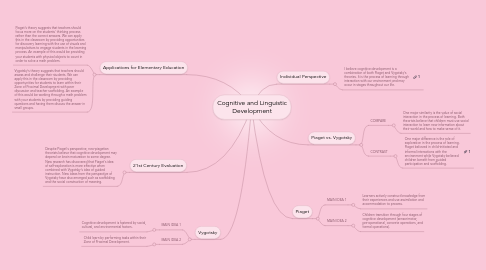
1. Vygotsky
1.1. MAIN IDEA 1
1.1.1. Cognitive development is fostered by social, cultural, and environmental factors.
1.2. MAIN IDEA 2
1.2.1. Child learn by performing tasks within their Zone of Proximal Development.
2. Applications for Elementary Education
2.1. Piaget's theory suggests that teachers should focus more on the students' thinking process rather than the correct answers. We can apply this in the classroom by providing opportunities for discovery learning with the use of visuals and manipulatives to engage students in the learning process. An example of this would be providing your students with physical objects to count in order to solve a math problem.
2.2. Vygotsky's theory suggests that teachers should assess and challenge their students. We can apply this in the classroom by providing opportunities for students to learn within their Zone of Proximal Development with peer discussion and teacher scaffolding. An example of this would be working through a math problem with your students by providing guiding questions and having them discuss the answer in small groups.
3. 21st Century Evaluation
3.1. Despite Piaget's perspective, neo-piagetian theorists believe that cognitive development may depend on brain maturation to some degree. New research has discovered that Piaget's idea of self-exploration is more effective when combined with Vygotsky's idea of guided instruction. New ideas from the perspective of Vygotsky have also emerged such as scaffolding and the social construction of meaning.
4. Piaget vs. Vygotsky
4.1. COMPARE
4.1.1. One major similarity is the value of social interaction in the process of learning. Both theorists believe that children must use social interaction to learn new information about their world and how to make sense of it.
4.2. CONTRAST
4.2.1. One major difference is the role of exploration in the process of learning. Piaget believed in child-initiated and informal interactions with the environment while Vygotsky believed children benefit from guided participation and scaffolding.
5. Piaget
5.1. MAIN IDEA 1
5.1.1. Learners actively construct knowledge from their experiences and use assimilation and accommodation to process.
5.2. MAIN IDEA 2
5.2.1. Children transition through four stages of cognitive development (sensorimotor, pre-operational, concrete operations, and formal operations).
